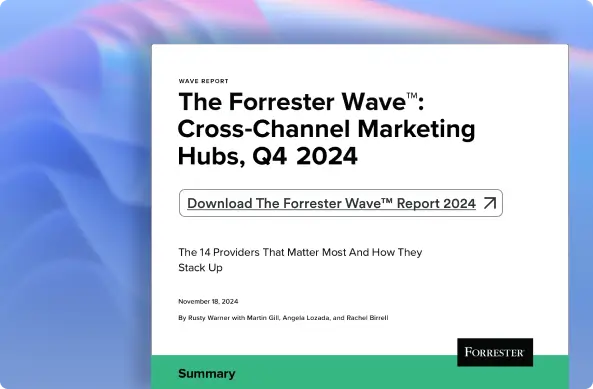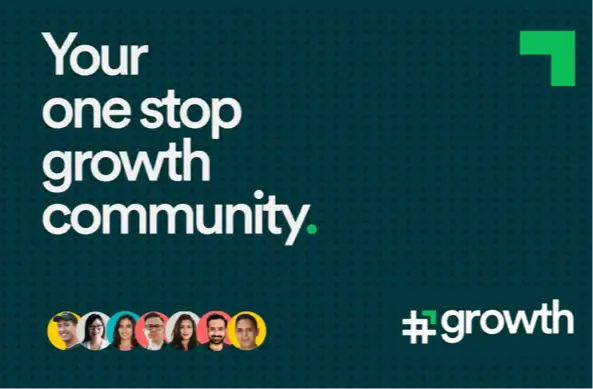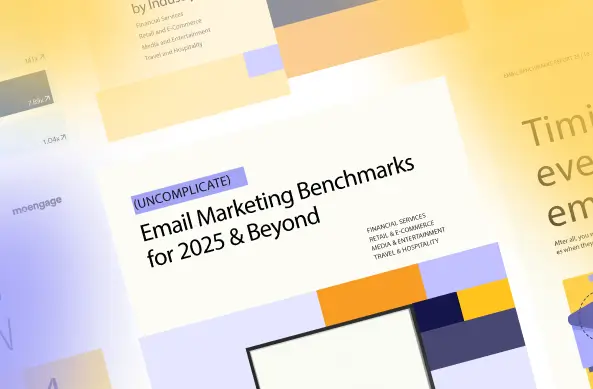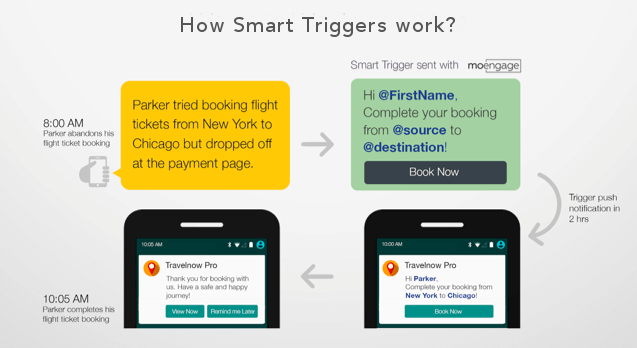Web Push Notifications: 7 Best Strategies to Get Them Right
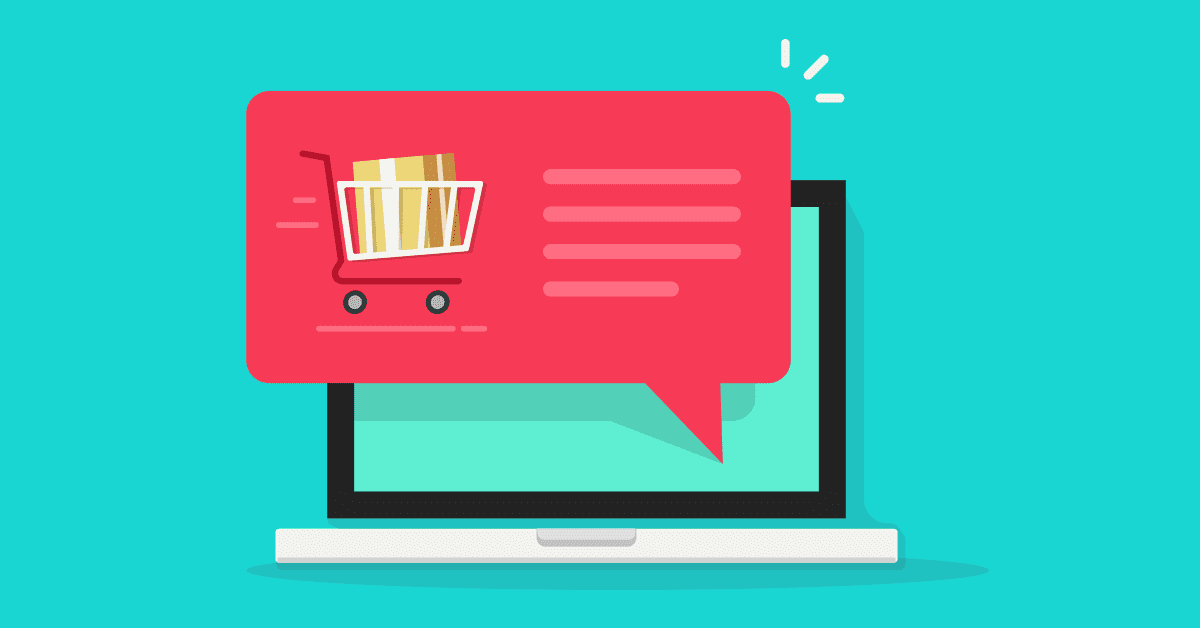
Reading Time: 6 minutes
|
Started on your web push notifications journey already? Well, that’s great! But just a batch and blast notification strategy, will not let you experience the true power of web push notifications.
It’s interesting to know how these push notifications work.
Done right, web push notifications can drive ‘spending customers’ by up to 28% and increase conversions for push-acquired visitors by up to 100%. Remember, desktop usage still accounts for 42% of total internet time and a sound push notification strategy can help bring in the much-needed website conversions.
| Bonus Content
👉 Boost User Engagement By Maximizing Push Notification Delivery Rates [Download Whitepaper] 👉 OYO Boosts Push Notification Delivery by 44% [Download Case Study] 👉 Shopo Reduces Dropoffs Through 13% Conversions on Push Campaigns |
Personalization in Web Push Notifications
Personalization in mobile app push campaigns can increase conversions by up to 4X. So, there is no reason it shouldn’t hold well for web push notifications.
Bonus Material – 9 Web Push Notification Strategies to Boost Web Conversions
While creating web push campaigns include elements of personalization messages such as user’s name, user’s city of residence, categories they viewed, products they added to cart, and such. This gives specific context and character to notifications making it harder for the users to ignore them.
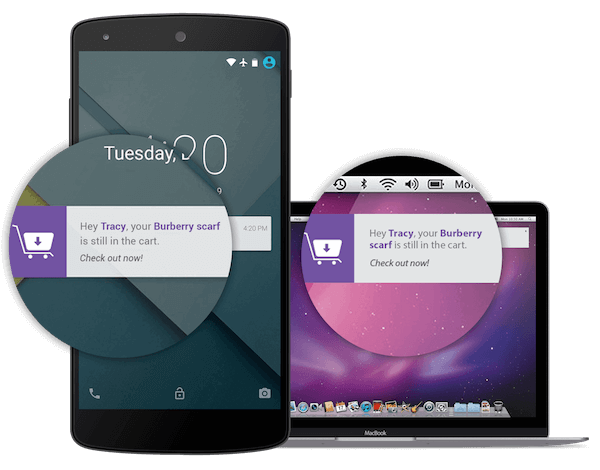
Check out the Name and Product viewed personalization in the above example. Personalization helps speak to users at a personal level and in context to whatever they did on your site thus increasing the chances of inciting action from the user.
Smart Trigger Web Push Notifications
It is highly common for users to get distracted while browsing your site. Users tend to ‘trail away’ from your website while comparing products, prices or when something urgent pops up. With smart triggers, identify specific events in the “conversion funnel” where users might trail off and bring them back to your site – even when they have closed your website. Check out the example below where a user is being ushered by push notification to come back and complete a flight ticket booking. Smart Triggers can be set to work on specific ‘events’ such as ‘cart abandonment’, ‘drop-offs’, or something as simple as ‘article read’ to trigger a relevant message upon completion of the above ‘events’. This makes it very handy while solving specific challenges on your website.

Segmentation in Web Push Notifications
Your users are unique. If you wish to speak to them individually, the least you could do is segregate them based on their likes and interests. With MoEngage, you can perform an event, interest, or behavior-based segmentation for visitors on your website. How about suggesting users visit a new Italian restaurant in the neighborhood to users who were checking out Italian restaurants on your website? Or how about suggesting the hottest Nike sneakers to users who were looking for sneakers on your website? Segmentation is a very powerful tool and can easily cut out marketing spam to users to a large extent.

Web Push Timing and Frequency
Well, timing is everything. No wonder it still is one of the core tenets of marketing! Use available DND (Do not disturb) mode to prevent delivering pushes to users late at night or early mornings when they are in a rush to get to work. Take a look at analytics to figure the best times at which your users are online and interact with your notifications.
Push notification frequency may not have a direct impact on conversions for individual push notifications. However, sending too many push notifications can annoy users, resulting in opt-outs. Take advantage of frequency capping settings while creating push campaigns to avoid spamming users with too many notifications.
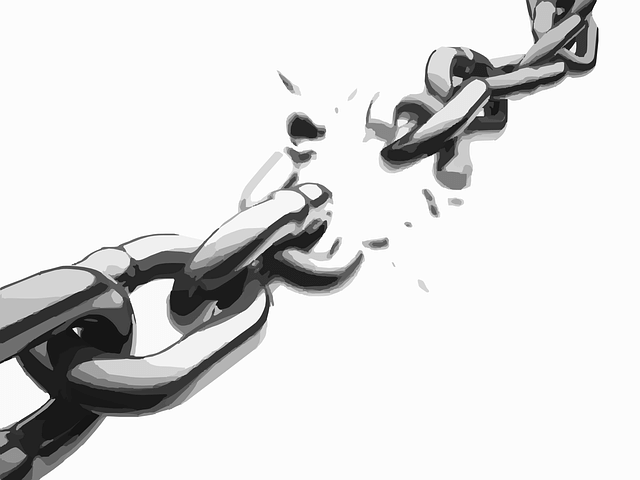
Override Auto Dismissal
Push notifications by default stay on screen for about 20 seconds before disappearing. But, what if your user was not in front of his computer during that period? Thankfully, there exists a setting to override this. By de-activating, ‘Auto dismissal’ the push notification stays on the screen till the user acts on it.

Push Notification ‘Time to Live’:
Push notifications have a short life when GCM tries to deliver the notifications to users. If the notification is not delivered after a specified time, GCM clears the notification from the delivery queue. Now, there could be several reasons as to why your users are not receiving push notifications. Therefore, By assigning a higher ‘time to live’ you can achieve higher views for your push notifications. However, you need to be careful while defining ‘Time to live’ for time-bound notifications such as ‘Two-hour discount sale’, travel information and such. No point in a user receiving a discount notification after the sale has ended or receiving a notification about cab details they have boarded the cab.

Push Notification Text + Image + Calls To Action
Users don’t have time for vague sounding push notifications that are not clear what they want from the users’ end. Here are a few things to keep in mind while creating push notifications:
Simple and action-oriented copy: Be assertive while writing copy for push notifications. Be clear with what you want to say to your customers using simple language without them having to scratch their heads wondering what you are saying. Also, make sure that the copy is action-oriented and i tells a user clearly to perform actions such as ‘Read this article’ or ‘Check out these items’ and such. Web push notifications generally have a character limit of 64 characters for the title and 120 characters for the description. However, refrain from maxing out on characters by using clever use of language. Pro tip: Check out the famous ‘six word story‘ technique by Ernest Hemingway.
‘Scarcity’ and ‘urgency’:Using these phrases could compel users to act on the notifications. This works almost always as ‘Prospect theory’ says that people make decisions based on a potential value of ‘losses’ or ‘gains’ they will get out of a given situation.
Use Social Proof: Social proof can compound the users’ decision to act on a notification in your favor. Use phrases like ‘50 people have already purchased this product’ or ‘1000s of readers have already signed up’ and such.
Images for action: While using images, try and stick to images that users associate with your brand directly or products that users can recognize without missing a beat.
To learn more about how you can optimize web push notifications for your business, reach out to an engagement expert by clicking below.

